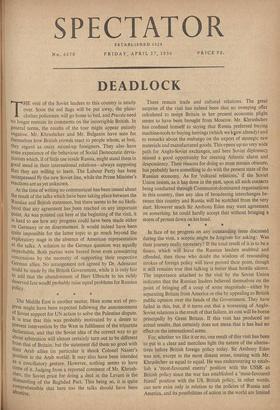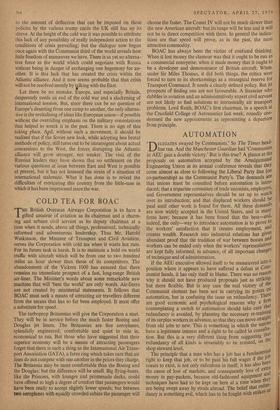DEADLOCK
THE visit of the Soviet leaders to this country is nearly over. Soon the red flags will be put away, the plain- clothes policemen will go home to bed, and Pravda need no longer restrain its comments on the incorrigible British. In general terms, the results of the tour might appear entirely negative. Mr. Khrushchev and Mr. Bulganin have seen for themselves how British crowds react to people whom, at best. they regard as crazy mixed-up foreigners. They also have some experience of the behaviour of Social Democratic devia- tionists which, if of little use inside Russia, might stand Them in good stead in their international relations—always supposing that they are willing to learn. The Labour Party has been unimpressed by the new Soviet line, while the Prime Minister's reactions are as yet unknown.
At the time of writing no communiqué has been issued about the result of the talks which have been taking place between the Russian and British statesmen, but there seems to be no likeli- hood that any agreement has been reached on any important point. As was pointed out here at the beginning of the visit, it is hard to see how any progress could have been made either on Germany or on disarmament. It would indeed 'have been quite impossible for the latter topic to go much beyond the exploratory stage in the absence of American representation at the talks. A solution to the German question was equally improbable. Both parties were barred from even considering concessions by the necessity of supporting their respective German allies. No arrangement not agreed by Dr. Adenauer could be made by the British Government, while it is only fair to add that the abandonment of Herr Ulbricht to his richly deserved fate would probably raise equal problems for Russian Policy.
* * * The Middle East is another matter. Here some sort of pro- gress might have been expected following the announcement of Soviet support for UN action to solve the Palestine dispute. It is true that this was probably motivated by a desire to Prevent intervention by the West in fulfilment of the tripartite declaration, and that the Soviet idea of the correct way to gp about arbitration will almost certainly turn out to be different from that of Britain; but the statement did them no good with their Arab allies (in particular it shook Colonel Nasser's Position in the Arab world). It may also have been intended as a conciliatory gesture. However,, nothing seems to have come of it. Judging from a reported comment of Mr. Khrush- chev, the Soviet price for doing a deal in the Levant is the dismantling of the Baghdad Pact. This being so, it is quite comprehensible that here too the talks should have been abortive. There remain trade and cultural relations. The great surprise of the visit has indeed been that no sweeping offer calculated to. tempt Britain in her present economic plight seems to have been brought from Moscow. Mr. Khrushchev has confined himself to saying that Russia preferred buying machine-tools to buying herrings (which we kgew already) and to remarks about the embargo on the export of strategic raw materials and manufactured goods. This opens up no very wide path for Anglo-Soviet exchanges, and here Soviet diplomacy missed a good opportunity for creating Atlantic alarm and despondency. Their reasons for doing so must remain obscure, but probably have something to do with the present state of the Russian economy. As for 'cultural relations,' if the Soviet Union insists, as it has done in the past, upon all such contacts being conducted through Communist-dominated organisations in this country, then any idea of broadening interchanges be- tween this country and Russia will be scotched from the very start. However much Sir Anthony Eden may want agreement on something, he could hardly accept that without bringing a storm of protest down on his head.
* In face of no progress on any outstanding issue discussed during the visit, a sceptic might be forgiven for asking : Was their journey really necessary? If the total result of it is to be a fiasco, which will leave the Russian leaders snubbed and offended, then those who doubt the wisdom of resounding strokes of foreign policy will have proved their point, though it still remains true that talking is better than hostile silence. The importance attached to the visit by the Soviet Union indicates that the Russian leaders believed themselves on the point of bringing off a coup of some magnitude—either by separating Britain from America or else by appealing to British public opinion over the heads of the Government. They have failed in this, but, if it turns out that a worsening of Anglo- Soviet relations is the result of that failure, its cost will be borne principally by Great Britain. If this visit has produced no actual results, that certainly does not mean that it has had no effect on the international scene.
For, whether we like it or no, one result of this visit has been to put in a clear and merciless light the nature of the alterna- tives before British foreign policy today. Sir Anthony Eden was not, except in the most distant sense, treating with Mr. Khrushchev as equal to equal. He was endeavouring to estab- lish a 'most-favoured enemy' position with the USSR as British policy since the war has established a 'most-favoured friend' position with the US. British policy, in other words, can now exist only in relation to the policies of Russia and America, and its possibilities of action in the world are limited to the amount of deflection that can be imposed on those policies by the various trump cards the UK still has up its sleeve. At the height of the cold war it was possible to attribute this lack of any possibility of really independent action to the conditions of crisis prevailing; but the dialogue now begun once again with the Communist third of the world reveals how little freedom of manoeuvre we have. There is as yet no alterna- tive force in the world which could negotiate with Russia without being in danger of exchanging one hegemony for an- other. It is this lack that has created the crisis within the Atlantic alliance. And it now seems probable that that crisis will not be resolved merely by tilking with the East.
Let there be no mistake. Europe. and especially Britain, desperately needs an end of the cold war and a slackening of international tension. But, since there can be no question of Europe's deserting from one camp to another, the only alterna- tive is the revitalising of ideas like European union—if possible without the overriding emphasis on the military connotations that helped to wreck it in the past. There is no sign of this taking place. Apd, without such a movement, it should be realised that if the Soviet new look, while adopting less brutal methods of policy, still turns out to be intransigent about actual concessions to the West, the forces disrupting the Atlantic alliance will grow stronger, not weaker. The visit of the Russian leaders may have shown that no settlement on the various questions at issue between East and West is possible at present, but it has not lessened the strain of a situation of international stalemate. What it has done is to reveal the difficulties of extricating this country from the little-ease in which it has been imprisoned since the war.











































 Previous page
Previous page